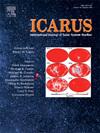Large impact features on Ganymede and Callisto as revealed by geological mapping and morphometry
IF 2.5
2区 物理与天体物理
Q2 ASTRONOMY & ASTROPHYSICS
引用次数: 0
Abstract
The icy Galilean satellites are host to a broad range of impact feature morphologies. Hypotheses seeking to explain the diversity of these impact features consider the effects of impact melt, the physical state of the subsurface at the time of impact, and the impactor characteristics. As part of a larger effort to assess the role of these factors in the formation and evolution of these impact features, we have performed topographic and geological mapping of 19 large impact features on Ganymede and Callisto. These are divided into two main morphological groups: craters (subdivided into pit, dome, and anomalous dome craters), and penepalimpsests/palimpsests. The transitions from pit, dome, to anomalous dome craters appear to be size-dependent up to diameters of ∼170 km. The morphologies of pit and dome craters appear to be independent of their age or geologic context. The impacts that formed them only affected a cold, rigid ice layer, with the development of pits and raised annuli on their floors possibly stemming from the evolution of a pocket of impact melt. The subdued rims and floors of anomalous dome craters indicate the increasing effect of a weak, warm ice layer on impact feature morphology with increasing size, but their prominent annuli and pits indicate that mobilization of impact melt is also a factor. The very low topographic relief of older penepalimpsests and palimpsests indicates that their impacts penetrated the ice shell to mobilize very large volumes of pre-existing liquid from a subsurface layer, with little contribution to the final feature morphology from impact melt. Penepalimpsests are distinguished from palimpsests by the higher frequency of concentric ridges within their interiors, indicating a generally more robust state of the subsurface that could better support the rotation and uplift of solid material during impact, even if a crater-like depression could not be supported. A few impact features seem to be transitional between anomalous dome craters and penepalimpsests, and the overlap of anomalous dome craters, penepalimpsests, and palimpsests in terms of diameter as well as age indicates that impactor size and subsurface properties over time are major factors in determining which of these morphologies emerges.
地质测绘和形态测量揭示的木卫三和卡利斯托大型撞击特征
冰冷的伽利略卫星上有各种各样的撞击特征形态。试图解释这些撞击特征多样性的假设考虑了撞击熔体的影响、撞击时地下的物理状态以及撞击者的特征。为了评估这些因素在这些撞击地貌的形成和演变过程中所起的作用,我们对木卫三和卡利斯托上的19个大型撞击地貌进行了地形和地质测绘。这些地貌分为两大形态组:陨石坑(细分为坑状、穹状和异常穹状陨石坑)和半椭球体/椭球体。从凹坑、圆顶到异常圆顶陨石坑的过渡似乎与直径在170千米以下的陨石坑的大小有关。坑状和穹状陨石坑的形态似乎与它们的年龄或地质背景无关。形成这些陨石坑的撞击只影响到冰冷坚硬的冰层,陨石坑底部凹坑和凸起的环状结构可能是由撞击熔融物形成的。异常穹隆陨石坑的边缘和坑底较低,这表明随着体积的增大,弱温冰层对撞击地貌形态的影响越来越大,但其突出的环状凹坑表明撞击熔融物的移动也是一个因素。较早的半侏罗纪火山口和重侏罗纪火山口的地形起伏很低,这表明它们的撞击穿透了冰壳,从地表层下动员了大量原有的液体,而撞击融化物对最终地貌形态的影响很小。半坍方地貌与重坍方地貌的区别在于其内部同心脊的出现频率较高,这表明次表层一般较为坚固,能够更好地支持固体物质在撞击过程中的旋转和隆起,即使无法支持类似陨石坑的凹陷。一些撞击特征似乎是异常穹隆陨石坑和半侏罗纪陨石坑之间的过渡,异常穹隆陨石坑、半侏罗纪陨石坑和垛状陨石坑在直径和年龄上的重叠表明,撞击物的大小和随时间变化的次表层性质是决定这些形态中哪一种出现的主要因素。
本文章由计算机程序翻译,如有差异,请以英文原文为准。
求助全文
约1分钟内获得全文
求助全文
来源期刊

Icarus
地学天文-天文与天体物理
CiteScore
6.30
自引率
18.80%
发文量
356
审稿时长
2-4 weeks
期刊介绍:
Icarus is devoted to the publication of original contributions in the field of Solar System studies. Manuscripts reporting the results of new research - observational, experimental, or theoretical - concerning the astronomy, geology, meteorology, physics, chemistry, biology, and other scientific aspects of our Solar System or extrasolar systems are welcome. The journal generally does not publish papers devoted exclusively to the Sun, the Earth, celestial mechanics, meteoritics, or astrophysics. Icarus does not publish papers that provide "improved" versions of Bode''s law, or other numerical relations, without a sound physical basis. Icarus does not publish meeting announcements or general notices. Reviews, historical papers, and manuscripts describing spacecraft instrumentation may be considered, but only with prior approval of the editor. An entire issue of the journal is occasionally devoted to a single subject, usually arising from a conference on the same topic. The language of publication is English. American or British usage is accepted, but not a mixture of these.
 求助内容:
求助内容: 应助结果提醒方式:
应助结果提醒方式:


